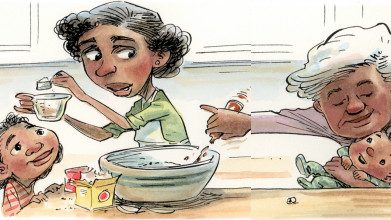Not posted yet
Jim Daly: Dr. Chapman, what’s one thing someone can do today to start working toward a better relationship with their in-laws?
Dr. Gary Chapman: Whoa. (laughing)
Jim: (laughing) Aaaah, it’s a big, it’s such a general question. But it’s a good one.
Dr. Chapman: I would say, ask questions rather than make comments. That is, ask your in-laws questions about their history, their childhood, their marriage, the parenting season of their life. Get to know as much as you can about your in-laws.
John Fuller: Mm. Well, some good advice from Dr. Gary Chapman. It is possible to get along with and enjoy your in-laws. We’ll tell you how on today’s Focus on the Family, with Focus president and author Jim Daly.
Jim: Uh, John, I’m not starting with an in-law joke. I mean, (laughs) so many people, they go, “Okay, what’s the best in-law joke you’ve got?” That kind of points to the problem, doesn’t it?
John: There’s a real stereotype, isn’t there?
Jim: There is. And, uh, we want to talk today about how you as a Christian, uh, build up that relationship with your in-laws. It’s so easy to tear down, and we make fun of it. But, uh, we want to give you some, uh, practical advice today: things you can put into action to make that relationship: which, by the way, is a very important (laughs) relationship in your life.
John: Mm-hmm.
Jim: Make it healthier and better. And to do that, we’re gonna talk with Dr. Gary Chapman.
John: And you heard just a little bit of his wisdom, uh, right there. And we’ve got a whole program for you, uh, with Dr. Chapman. He’s perhaps best known for his book, The Five Love Languages. Uh, Jim, that’s one of the books I always recommend to, uh, younger couples.
Jim: Mm-hmm.
John: And we’ll be referring to another great book he wrote called Happily Ever After: Six Secrets to a Successful Marriage. And, uh, one of the sections deals with having a better relationship with your in-laws.
Jim: Uh, Gary, it’s great to have you back on Focus on the Family.
Dr. Chapman: Well, thank you. Good to be back.
Jim: Uh, this area of in-laws can be such a humorous, uh, activity … but also debilitating.
Dr. Chapman: Yes, and you don’t often anticipate it. You assume that the in-law relationships are gonna be positive and good, unless you’ve had a big blowout somewhere along the line. You just assume that, uh, we’re- they’re gonna treat us kindly, we’re gonna treat them kindly, everything’s gonna be good. And when you get married, the in-laws start doing things, saying things that you never anticipated they would do. And they begin to irritate you.
Jim: Huh.
Dr. Chapman: And so you get into an adversarial relationship.
Jim: Well, and I need to, uh, you know, let everybody know: I don’t have a great deal of experience here with in-law battles. Because Jean, of course, with my parents being gone, Jean never had to really deal with an in-law problem. Uh, because we lost my mom and dad at such a young age. Uh, but even with her mom and dad, they were close to us geographically. And, uh, they were always loving and kind. But, uh, you know, it was Christmas, they never over-engaged in our family dynamics.
Dr. Chapman: Hm.
Jim: So we had a real, uh, easy experience with in-laws. And, uh, so I’ll be intrigued today to hear some of the stories (laughs)-
Dr. Chapman: (laughs)
Jim: … about what causes that pain. John, how about you?
John: Well, uh, that’s putting me on the spot. But I will say that-
Jim: (laughs)
Dr. Chapman: (laughs)
John: … uh, I’ve really been, uh, fortunate to marry into a great family. And, uh, Dena’s dad passed away a few years back, but I really appreciated him and, uh, love her mom. And for some reason, her parents have loved me. And so I- (laughs)
Jim: (laughs)
Dr. Chapman: (laughs)
John: … felt very accepted.
Jim: Well, you’re lovable.
John: Yeah, well, yeah. But sort of the stereotypes don’t seem to fit for- for our experience, either.
Jim: But, you know, Gary, what’s so interesting is how much tension is around this area for those that counsel people and couples. This is an area, uh, when you get beyond, uh, money and intimacy, the next one up to bat will be difficulty with in-laws. Why is there so much tension is these relationships?
Dr. Chapman: Most of it centers around in-law interference.
Jim: Hm.
Dr. Chapman: That is, the in-laws do things or say things. I remember the wife who said to me, “You know, uh, every year for our vacation, we only have one week of vacation. And every year, we have to spend it with his parents.” She said, “I would just like for us to be able to do something on our own.” See, that’s interference.
Jim: Hm.
Dr. Chapman: The parents’ expectations of how the couple’s gonna respond to them. And that’s the area where we have most of the conflict.
Jim: You know, so often we’re talking on the broadcast about, uh, communication in marriage. You’ve been one of the foremost authorities in that regard. But that communication has to be almost equally as effective in the in-law relationship, doesn’t it?
Dr. Chapman: And often it is not.
Jim: Yeah.
Dr. Chapman: But we don’t know how to respond. We have this anger. We have this hurt. Uh, we feel like they should stay out of our lives, or not be so involved in our lives. But we don’t know how to say it. And we share it with our spouse. And we talk about their mother and father.
Jim: (laughs) Right.
Dr. Chapman: (laughs) And so now, the two of us get into it.
Jim: Mm-hmm.
Dr. Chapman: Because they feel like, “Well, they’re not being really being that overbearing.” And they “Why do you, you know, da-da-da?” And so we get into it over the in-laws. And normally, and many times, it’s two or three years down the road before we ever get around to sharing it with the in-laws and begin to work out the problem.
Jim: Hm. In fact, in your book you talk about marriage is a- the need for them to run on parallel tracks of separation from parents and devotion (laughs) to parents.
Dr. Chapman: Yeah.
Jim: And that- that can collide, can’t it?
Dr. Chapman: It can, but that’s the biblical pattern. You know, Genesis Chapter 2 and Ephesians Chapter 5, both say the same thing: “A young man shall leave his father and mother when he gets married. Cleave to his wife.” But then you have the biblical admonition, we’re to honor our parents. And that’s never rescinded.
Jim: Hm.
Dr. Chapman: Well, they- they gave us life, maybe they’re not honorable in their lifestyle. But they gave us life. And we’re to honor our parents.
Jim: Let- uh, let me ask you this, though, in that context, uh, of the example you just gave. So you have the couple and every, uh, vacation that they get, their parents, one set of those in-laws, they’re expecting them to spend time with them.
Dr. Chapman: Mm-hmm.
Jim: H- how do you leave and cleave and say, “Honey, we’re gonna do it just as a nuclear family, you and me and the kids”?
Dr. Chapman: (laughs)
Jim: “We’re not gonna include my parents.” And yet, honor your parents who have that expectation: the way they feel honored, is by you going and spending your vacation with them.
Dr. Chapman: Yeah. And this is where negotiation comes in. And if you think in terms of negotiation, whether it’s a couple who are negotiating a difference between the two of them, or you’re negotiating a difference between the in-laws. By negotiation, I mean, you try to find a compromise. And you throw out an idea, first of all, to each other. “Honey, what if, at least initially, we have vacation with them this year, but the understanding that next year we’re gonna do our own thing?”
Jim: Mm-hmm.
Dr. Chapman: “Can we start off that way?” If the two of you can agree on it, then you can pose that to the in-laws. You know, “Mom and Dad, we enjoy being with you. We appreciate you, uh, inviting us to the vacation.” ‘Cause typically the parents are paying the whole thing when they- (laughs) when you’re on the vacation.
Jim: Right.
Dr. Chapman: “We appreciate it. Uh, but we also want to have some time to ourselves, and we only have one week off. And so, if it’s okay with you, we’d like to propose this year, we go- we have vacation with you, and next year we’re gonna do our own vacation.”
Jim: How- how do you set the environment for that? I mean, that- I- I’m thinking of this busy home, and you’ve got two or three little ones running around. And, uh, mother-in-law comes over to, uh, have a cup of tea with you as the daughter-in-law. And you’re into this discussion. And in the midst of that, you’re saying, “Oh, by the way, Mom, you know, next year we’re not- uh, we really don’t think we can get out and do the vacation with you.” How do you pick and choose the opportunity in the- in the moment to have that discussion?
Dr. Chapman: I think you want to choose the time typically when it’s just the two of you. And, uh, it’s best for the child to speak to their own parents.
Jim: Hm.
Dr. Chapman: Rather than to speak to your in-laws about one of these issues.
Jim: Well, let me ask you about that. So if, uh, it’s your husband’s parents, would you then suggest that the husband feed that information to the parents?
Dr. Chapman: Yes.
Jim: Rather than the daughter-in-law?
Dr. Chapman: Yes. Yes. He speaks to his own mother and father. And he says, “You know, Mary and I have talking and thinking. We’re having a little struggle, but we- we’ve come to an agreement ourselves. And I- I just want to propose it to you. First of all, I want to say how much I appreciate the fact that you always invite us to go to the beach with you every summer. We love it. “But also, as a new couple, we’d like to do some things on our own. So I’d like to propose that we go to the beach with you this summer, and then next summer we’ll take our own vacation. Then the next summer we’ll come back with you. You think that’ll be okay?” So he’s talking to his own mother and dad. So he’s got that relationship.
Jim: Mm-hmm.
Dr. Chapman: And they, if they’re wise, will understand what he’s saying, and they will agree to that. And if not, then there comes a place, you know, parents don’t agree with that, “Well, what would you propose, Mom and Dad?”
Jim: Put it on them.
Dr. Chapman: Yeah. Yeah. Let- let-
Jim: Let them make the proposal.
Dr. Chapman: Let them make the proposal.
Jim: Yeah.
Dr. Chapman: And so you kind of work back and forth. Uh, there is a place, however, when if the two of you really feel that something needs to be done differently, a- and the parents after negotiation can’t agree, you say … And y- again, you speak to your own parents … You say, “You know, Mom and Dad, I really appreciate what you’re saying; makes a whole lot of sense. But we have to make our own decisions. And I don’t want to hurt you. But we’re going to …” And you tell them what you’re gonna do.
Jim: Yeah. You know, Gary, so often, uh, as parents; and I’m talking about the grandparents, or the older parents in this case; uh, we’ve had a life of control in this relationship.
Dr. Chapman: Yeah.
Jim: We raised these children; they’re now grown adults. They’re married. But we still, and I think for moms particularly, the older mom of a adult child, i- it’s hard to let go.
Dr. Chapman: Yeah.
Jim: And to say, “Okay, do your own thing.” Because, um, you know, so much of your identity is wrapped up in your children, even still.
Dr. Chapman: Yeah.
Jim: And certainly the grandchildren; and you want to spend time with them and all those good things. How does a- an older mom and grandmother realize that, “Ooh, okay, I’m over the line. I am trying to control-”
Dr. Chapman: Yeah.
Jim: “… my daughter or my son. And I’ve gotta back off”?
Dr. Chapman: I think you recognize it probably when they give you feedback; when you see them bristling or drawing back from something. Or your son or daughter tells you, “You know, Mom, my wife’s having a hard time with this. And da-da-da.” And so you start talking with them. Sometimes that’s the first time they ever recognize it. Because let’s face it: much of what in-laws do is out of a good motive.
Jim: Sure.
Dr. Chapman: I remember though, a young wife who said, “You know, Dr. Chapman, we, uh, we were gone for three days. And I came home, and my mother-in-law had come into our apartment and had put up window treatments on all of our windows.”
Jim: (laughs)
Dr. Chapman: And she said, “I didn’t want window treatments. I just wanted blinds. And I don’t know how to say it to her, ’cause she spent a lot of money on it.”
Jim: That’s expensive.
Dr. Chapman: You know? So, the intentions was good. But it irritated the- the in-law. And what I say to parents is, “If you want to do something for your child that you think would be good for them, ask them before you do it.”
Jim: Hm.
Dr. Chapman: Say, “Would it be helpful to you if I got window treatments for your windows?”
Jim: Hm.
Dr. Chapman: And then she’s gonna say, “No, really, I like just the plain blinds. I- just that’s who I am, and that’s what I like.”
Jim: Hm.
Dr. Chapman: So don’t do it until you ask them, “Would it be helpful to you if I did this?”
John: Well, I can just imagine that some of those conversations aren’t questions; they’re more statements, like, “You need window treatments-”
Jim: (laughs)
John: “… on those windows.”
Dr. Chapman: Yeah.
Jim: Yeah. Sounds like a parent to a child.
John: Kind of leads to a not-very-good conversation.
Dr. Chapman: You know, and that’s why, again, we should always speak for ourselves, rather than for the other person. You know, m- “I think they would like nice in here if you had window treatments,” rather than, “You need window treatments.”
Jim: (laughs)
Dr. Chapman: Use the word “I,” and the word- rather than the word “You.” And the same thing true with the other way around. If the daughter-in-law is saying to the mother-in-law, “You know, uh, you mentioned the other day the possibility of putting we- window treatments in our- in our apartment for us. And I really appreciate, uh, that idea. Uh, and I know that you’d be doing a lot for us. But I have to be honest with you: I really appreciate just the blinds. And that’s really- I would pre- actually prefer to have the blinds.”
Jim: Hm.
Dr. Chapman: “So, if you can help with some other way, that would be good. But I prefer the blinds.”
Jim: That’s always good to think about you’re approaching each other.
Dr. Chapman: Yeah.
Jim: And, uh, that’s a good thing. It’s hard to let go, and I get that. Uh, I talked to a grandfather the other day. And his issue was a little different than all of this, than what we’re talking about. He is the father of two sons. And I certainly go out, because I’m the father of two sons. But his two sons married, and the thing that he struggles with is that most holidays, Christmas and Thanksgiving and those- those times, uh, they’re going to the daughters’ parents’ house. Because it’s the son, and the son is acquiescing, and he just says, “I don’t get enough time to see them. We’re the 10% grandparents, not the 90%.”
Dr. Chapman: Yeah.
Jim: And in fact, he said, “What’s worse is the other set of grandparents are kind of demanding that they spend time with them.”
Dr. Chapman: Yeah.
Jim: So they’re the outside grandparent couples.
Dr. Chapman: Hm.
Jim: Talk about that dynamic, between the two sets-
Dr. Chapman: Yeah.
Jim: … of grandparents.
Dr. Chapman: Well, one of the things I’d say to the young couple is this: “You honor your parents by seeking to treat each of them with equality as much as possible.” Now obviously, if one set lives in California and one set lives two blocks away from you, then you’re gonna spend more time with the one that’s two blocks away from you. But the principle should be equality. “If we’re gonna spend Christmas here this year, we’re gonna spend Christmas over here- with the other in-laws next year. Then we’ll have a Christmas by ourselves.” So, it’s a matter of trying to treat both of them with equality. Because if you don’t, then this grandfather’s experience is gonna be the norm: the one that feels like they’re 90% with the others and 10% with us. They’re gonna be hurt.
Jim: Right.
Dr. Chapman: And they’re gonna feel dishonored by you.
Jim: Right.
Dr. Chapman: So I think the couple needs to discuss this early on in the relationship. That we’re gonna … And let’s face it. Sometimes, one set of in-laws are much more pleasant to be around-
Jim: Mm-hmm. Right. (laughs)
Dr. Chapman: … than the other set (laughs) of in-laws…
Jim: But some-
Dr. Chapman: …and we will be tempted to spend more time with them than we will with the ones that are more difficult.
Jim: Well, I would think that sometimes that’s the opposite, though. That the other set of in-laws can be very controlling. And the daughter or the son, whichever the case may be, doesn’t know how to break that pattern. And they’re- they’re uncomfortable dealing with it. So they just go with the flow, rather than create problems. And that can really create some friction.
Dr. Chapman: Yeah. Real friction between the couple themselves.
Jim: Right.
Dr. Chapman: Because the one feels like, “Well, this is my mom and dad. We’ve always done it this way, you know? And when your- your parents don’t care. In fact, they don’t like us anyway.” (laughs)
Jim: (laughs) That would be an interesting conversation.
John: Probably a recipe for disaster, I guess.
Jim: Yeah.
Dr. Chapman: (laughs) Let me say a word to the parents themselves. Remember the objective in raising your children: independence. You raised them to be able to go out on their own in the world and make a contribution. So don’t control them after they get married.
Jim: Hm.
Dr. Chapman: You raised them to be independent. Let them be independent.
Jim: Mm.
Dr. Chapman: And I don’t mean that you don’t help them. If you’re able to help them and they want your help, then that can be fine and good. But don’t continue to hover over them and feel like you’ve got to make every decision for them.
John: Hm. Some great wisdom from Gary Chapman on today’s Focus on the Family. And you can find out more about his book, Happily Ever After, which includes a section devoted to your relationship with your in-laws. Uh, it’s both for younger couples and more seasoned couples. Um, look for details at focusonthefamily.com/broadcast. Let’s return now to more of the conversation with Dr. Gary Chapman.
Jim: Those kinds of examples, uh, Gary, are so- so practical. The other one that is really sensitive, uh, is the parenting of the grandchildren. Uh, this is big. Everybody just leaned into the radio now.
Dr. Chapman: (laughs)
Jim: But I mean, there’s where you have a lot of friction, too. Because, uh, the younger adult children that are raising the little ones, they don’t like them having as much sugar as your mom and dad would like to give them. “And I’m tired of taking them home and they’ve got this sugar high. And it’s because your mom keeps giving ’em an overdose of sugar.”
Dr. Chapman: (laughs)
Jim: “So you’ve gotta tell them to knock it off.”
Dr. Chapman: Yeah.
Jim: I mean, I mean, does everybody else hear that one?
Dr. Chapman: (laughs)
Jim: So I mean, how do you- how do you negotiate those things, uh, when it’s discipline, how we discipline our kids? And it’s different, Mom and Dad, from how you disciplined us? How we watch their diet maybe different than how you did it? How we watch what they do with video games? What toys they play with? I’m going through the whole-
Dr. Chapman: Oh, yeah.
Jim: … hot button list here.
Dr. Chapman: Oh, yeah.
Jim: But what movies you might take them to. Um, talk about that, how you set down the parameters for what’s doable and what’s over the top.
Dr. Chapman: Well, these are common issues. And this is why there are so many jokes about mother-in-laws and father-in-laws and so forth. Because this is very real; these are conflict areas. I think to the young couple, I would say, “Recognize first of all, you have the responsibility to raise your children; the primary responsibility. “Now, grandparents can be a great help. Or they can also be a detriment in raising your children. But you have the responsibility. And your primary loyalty, as a husband and wife, is to each other.” See, the tendency is that the husband, o- or wife sometimes, doesn’t break the apron strings. They don’t leave the parents. And they’re so tied to the parents. And sometimes those emotional ties are very twisted, uh, that they are unwilling to confront the parent with what’s going on.
Jim: Hm.
Dr. Chapman: Like, just take this sugar deal, for example. Maybe the guy is saying, “Oh, it’s not so bad. I mean, they’re only over there twice, you know, every m- once a month, and a little sugar is not gonna hurt them.” And so, you know, we’ve got our own conflict about this. So the two of you gotta get together first, because you can’t take a convoluted, you know, proposal to them. You’ve got to get together on it first. And one of you’s gonna have to give. I mean, you know, there’s basically three ways to solve your conflict. One is, you go to the other’s position, or you find a meeting place in the middle. Or you agree, “We haven’t decided this yet, so let’s not stay up after midnight. (laughs) We work on this tomorrow.”
Jim: (laughs) Right.
Dr. Chapman: Uh, but you’ve gotta resolve that yourself. Then the child of the in-law is to communicate to them your decision. That Mom … and I- I would say not decision at this point. I would say, you make a proposal to your grandparents and say, “Mary and I have been talking. And, uh, I know that you like to give the kids cookies and da-da-da-da-da.”
Jim: (laughs)
Dr. Chapman: “But we- we’ve got a new rule at our house. And the kids only get a cookie on Thursday nights.” (laughs) Whatev- whatever- whatever that is. “And so, we would like to ask you to honor our new rules at our house, so that the kids are not conflicted by two things. I think you can understand that, Mom.” And Mom says, “Well, yeah, but a little sugar’s not gonna hurt them.” (laughs)
Jim: (laughs)
Dr. Chapman: You say, “I understand, Mom, it probably won’t. But it’ll make life a lot easier for all of us.”
Jim: Yeah.
Dr. Chapman: You know, and so you- again, you negotiate with your parents. Uh, but you can’t just sit back and hope that they’re gonna change. They won’t unless you verbalize it. You gotta talk to them about it.
Jim: Uh, Gary, we’ve talked a lot about that negotiation strategy, and- and making your desires known, each direction, to the, uh, in-laws and to the married younger couple. Uh, but what happens when that you think you got the deal. You struck the deal; it may not be a written contract.
Dr. Chapman: (laughs)
Jim: But let’s say Grandma just keeps feeding them those great molasses cookies.
Dr. Chapman: Yeah.
Jim: And, uh, they keep coming home talking about how many they ate.
Dr. Chapman: (laughs)
Jim: “And Grandma gave me four dozen cookies.”
Dr. Chapman: (laughs)
Jim: “We love Grandma, Dad. We love Grandma.”
Dr. Chapman: (laughs)
Jim: But what- what if it breaks down and even though you’ve done it, and had the discussion, they continue with the same behavior?
Dr. Chapman: I think that’s when the son has to say to the mother, “You remember what we talked about last month? Uh, and I know we agreed on it. But I notice it hasn’t changed. So, uh, we’re not gonna let the kids come over next weekend.”
Jim: Mm. So you really go hard on the boundaries.
Dr. Chapman: You- you go hard on them. And just one weekend; you’re not gonna let them come over next weekend. “And, uh, I want you to think about it, Mom. I want them to be with you. But this is serious to us.”
Jim: Hm.
Dr. Chapman: She’ll get it.
Jim: It’s almost- that sounds like you’re parenting the parents.
Dr. Chapman: You are. Yep, you are. (laughs)
John: And- and- and now coach the child who says, “I had the conversation. She didn’t get it.” And it’s- so do I go another weekend? Two weekends?
Dr. Chapman: Yeah, I-
John: Three weekends with no kids?
Dr. Chapman: … I- I think you- there has to be consequences when people don’t … When in-laws are not open to negotiation with things that are important to the parents of the child, then there does come a place in which we have to make the decision, and say to the parents, you know, “This is what’s going to happen.”
Jim: Hey, Gary, let me throw another monkey wrench at you. Uh, this is fun, actually.
Dr. Chapman: (laughs)
Jim: All these different scenarios are popping into my head. But you’ve got couples, and I think this is wonderful when a, uh, couple can have either their mom or dad, uh, come back and live with them. Um, you know, I studied in Japan.
Dr. Chapman: Mm-hmm.
Jim: That’s very ingrained in the Asian culture, and it’s a beautiful thing, typically. They don’t believe in, um, sending people off to the old person’s home. Families take care of their moms and dads in Asia. It’s just what is expected. Um, and so I applaud that. I think it’s a wonderful thing to do. Not everybody’s in the right place to do that. And our culture tends to be more self-centered, to be blunt. But talk about that environment where, um, you know, his parents or maybe his mom, who is a widow now, is coming to live with them. Um, it’s close quarters. It’s hand-to-hand spiritual battle (laughs) sometimes. H- how do you manage that environment, which might be a little different than them being two blocks or two states away?
Dr. Chapman: Yeah. Yeah. Well, you know, I think in the early stage of a marriage, I encourage couples to live alone, separate from parents. Now, sometimes they will live with parents for a while.
Jim: What’s a rule of thumb? Amount of time?
Dr. Chapman: A rule of thumb, I would say, I would say as soon as you can get your own place, you ought to have your own place. Because you’re establishing a new relationship in those early years, and that’s important. So if you leave the parents, and yet honor the parents through the process, when you get to that stage where one of them has to move in with you, or you choose to move them in with you, because the relationship has been a positive relationship, it won’t be that difficult.
Jim: Right.
Dr. Chapman: Because you will have known each other, interfaced with each other. And I have many people say to me, “You know, my dad has lived with us now for seven years. And things could not have been better. He just- he respects us, we respect him. He has his space, we have our space. And- and the relationship is good.” There, you’re back to just human relationships. Couple living in close proximity have to learn how to give and take with each other, and have to learn how to process life with each other. And that means communication. Because if you resent the person’s behavior that’s now living with you, and don’t share it with them, then you’re gonna go on resenting; it’s gonna get worse and worse. But if you talk about it early on, and the earlier you talk about the conflicted areas and get them resolved, the better. And then you can have a good life together.
Jim: Uh, Gary, that is so good, uh, to remind us that healthy communication is where it all-
Dr. Chapman: Hm.
Jim: … flows.
Dr. Chapman: Yeah.
Jim: And, uh, we’ve talked about those more difficult situations, sometimes, with a little chuckle in our voice. But there are many, many good grandparents and older parents that are managing this well. I’m hoping it’s the 80/20 rule. And that 80% are doing it well, and people feel good about all the, uh, interfamily interaction. Um, hopefully it’s the 20-30% that we’re addressing today; how to give them a tool to, uh, do it a little better. And to release some of that pressure that exists in those relationships. Uh, in fact, in your book, w- you talked about the seven principles that can radically change that in-law relationship. Uh, we talked about a couple of them today: listen before you speak, and then the, uh, learning the art of showing respect; that’s kind of what you’re touching on here.
Dr. Chapman: Mm-hmm.
Jim: Um, let’s come back next time and flesh out a few more of those, uh, good principles that you mention in your book. Can we do that?
Dr. Chapman: Good. I’d be happy to.
John: Lots of practical biblical insights from Dr. Gary Chapman today on Focus on the Family. And we’re gonna pause right there. There’s still a lot more to come next time.
Jim: I love Gary’s thoughts on choosing peace for your family, and for your marriage, by intentionally building your in-law relationship. Some people don’t think about that, but it is so important. You know, helping you have a thriving, Christ-centered marriage is constantly on our hearts here at Focus on the Family. I hope you appreciate that. Uh, that’s why we bring you programs like this one. But with growing economic challenges in our nation, and a barrage of unhealthy messages from the culture, more and more marriages are in trouble. You can help husbands and wives, just like yourself, redeem their marriages through our Hope Restored Marriage Intensives.
John: Yeah, those retreats have transformed thousands of marriages. Highly qualified marriage counselors walk couples through their issues and give them practical help to make healing changes.
Jim: And it works. More than 80% of the couples surveyed are still married two years after their Hope Restored experience, with significant improvement in their marital satisfaction. That should, uh, encourage anybody to go. Currently, we have locations in Missouri, Georgia, and Michigan. And because these intensives have been so successful, we’re aiming to open other strategic locations across the country. We’ve launched the program in Arizona, even though we don’t have the permanent facility there, we are in temporary quarters. And we’ve purchased a retreat center that we’re kind of refabbing right now in Wimberley, Texas, just outside of Austin. So I want to ask: will you help us? In addition to Hope Restored, your support allows Focus on the Family to continue providing resources like this broadcast, podcast, counseling resources, print and online materials, mentoring training, special events, and so much more. I think together we will literally reach hundreds of thousands of people that are struggling in their marriage. And, uh, also, another stat: 150,000 people last year coming to Christ.
John: Hm.
Jim: So invest in that. $30 saves one marriage through our Hope Restored Marriage Intensives and other resources. But really, any amount will help. In fact, when you donate today, we’ll send you a copy of Dr. Gary Chapman’s book that we discussed today, Happily Ever After: Six Secrets to a Successful Marriage, as our way of saying “Thank you” for being part of the ministry, and saving marriages. Won’t you join us?
John: And through a special matching gift opportunity, provided by generous friends who care about marriages and family, your donation will be doubled to impact twice as many marriages. Donate today and request your copy of the book Happily Ever After at focusonthefamily.com/broadcast. Or when you call 800, the letter A, and the word FAMILY. 800-232-6459. Plan to join us tomorrow for more of the conversation with Dr. Gary Chapman. On behalf of Jim Daly and the entire team, thanks for listening to Focus on the Family. I’m John Fuller, inviting you back as we once again help you and your family thrive in Christ.

























